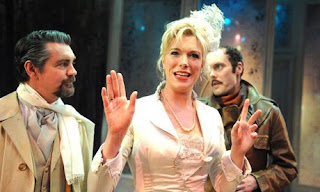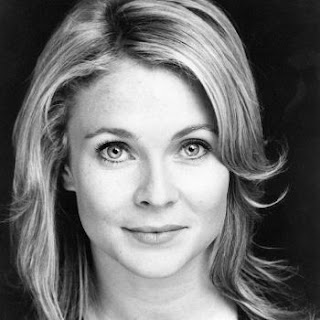 MUSIC. While not the best production, it still sparkled and the intimacy of the auditorium suited the show's atmosphere of stifled love and whispered indiscretions. In fact the intimacy at times was frightening as we were in the front row which is on stage level. The benches are low - and purgatorially hard - so during the opening waltz number as they swished dangerously close to us at times it felt like I was kneeling in the middle of a dancefloor. At it's conclusion I was not so moved as to give a standing ovation - luckily so as otherwise I would have been nose-to-nose with the cast.
MUSIC. While not the best production, it still sparkled and the intimacy of the auditorium suited the show's atmosphere of stifled love and whispered indiscretions. In fact the intimacy at times was frightening as we were in the front row which is on stage level. The benches are low - and purgatorially hard - so during the opening waltz number as they swished dangerously close to us at times it felt like I was kneeling in the middle of a dancefloor. At it's conclusion I was not so moved as to give a standing ovation - luckily so as otherwise I would have been nose-to-nose with the cast.Nunn says that he wanted to get the flavour of the source material - Ingmar Bergman's SMILES OF A SUMMER NIGHT - and I think he succeeded, there were times when I was reminded of the film rather than the previous productions I have seen. One area he has not is to do his usual shtick of slowing everything down to a 3 hour crawl so you don't get out till 11pm. It's a long time on the unforgiving benches and also there are some ponderous spells in the pacing - most unforgivably, the 86'd song "Silly People" has been reinstated - a song sung by a minor character which treads water and fully justifies it's original exclusion - you can see why Sondheim wrote it but it impedes the flow of the story.
 Hard to believe this is it's first London revival in 13 years but I found myself remembering most of the Hugh Wheeler's knowingly frivolous book, Hal Prince described the show as "whipped cream with knives" which is a good enough take on this witty but resigned look at the many facets of love, it's unpredictability and it's hurt and it's effect on nine characters.
Hard to believe this is it's first London revival in 13 years but I found myself remembering most of the Hugh Wheeler's knowingly frivolous book, Hal Prince described the show as "whipped cream with knives" which is a good enough take on this witty but resigned look at the many facets of love, it's unpredictability and it's hurt and it's effect on nine characters.Fredrick Egerman, a middle-aged lawyer has been married for eleven months to the teenage Anne who he knew as a little girl, however the marriage has yet to be consumated! The household is completed by Frederick's son Henrik, a serious Lutherian student who is quietly tormented by lust usually taken care of with knowing frankness by the maid Petra.
The catalyst for change is the appearance of the touring actress Desiree Armfeldt who we discover had a relationship with
 Frederick 15 years earlier and a meeting in her hotel room after her show rekindles their love. Complications arise when Desiree's jealous lover Carl-Magnus discovers Frderick's existence and plans his downfall with the help of his lovelorn, cynical wife Charlotte whose younger sister knew Anne at school. Matters come to a head when they all appear at the country estate of Desiree's mother, a noted courtesan who despairs for her daughter's life and who has taken charge of the upbringing of Desiree's teenage daughter Frederika.
Frederick 15 years earlier and a meeting in her hotel room after her show rekindles their love. Complications arise when Desiree's jealous lover Carl-Magnus discovers Frderick's existence and plans his downfall with the help of his lovelorn, cynical wife Charlotte whose younger sister knew Anne at school. Matters come to a head when they all appear at the country estate of Desiree's mother, a noted courtesan who despairs for her daughter's life and who has taken charge of the upbringing of Desiree's teenage daughter Frederika.The performers mostly managed to convey the witty sophistication but quiet desperation of their characters. Alexander Hanson, who I saw as the tormented Henrik in the 1989 production at the Piccadilly, has now grown up to play the father. He gave a charming performance as Frederik, world-weary but with a twinkle in the eye. Gabriel Vick found hidden humour in the frustrated Henrik which can be a hard role to pull off successfully. It appears you cannot stage a musical at the Menier without Kaisa Hammerlund and she brought a real charm to Petra, the maid who is the most emotionally honest of the
 characters which is why her solo number "The Miller's Son" is the last song of the night. I am sure it helps that Hammerslund is from Sweden!
characters which is why her solo number "The Miller's Son" is the last song of the night. I am sure it helps that Hammerslund is from Sweden!Petra wakes from a shag with Mme. Armfeldt's butler and muses on what life holds for her - more lovers and eventual marriage to a working class man although she could just as easily snare a richer man. Petra knows her place in the world, what she can expect from it and how you have to enjoy the hand you've been dealt. Lesley Duncan was a delightful Petra in the compromised film version but her song was cut and while not eclipsing the definitive "The Miller's Son" by Diane Langton on the London cast recording, Kaisa came very close
.
 The bristling dragoon Carl-Magnus was ably played by Alistair Robins although vocally he was a touch lightweight - bear fans, you will enjoy his surprising stripping off in the second act. The pivotal role of the imperious Mme. Armfeldt was played by Maureen Lipman who wrung every last drop of humour from the role - she was particularly fine in the socially awkward dinner scene in the second act but her solo number "Liaisons" would have been better if more reflective. On the subject of Mme. Armfeldt, I have yet to see a production which manages the final moment as I suspect it was intended to be played as there is usually something else happening on stage to draw the attention.
The bristling dragoon Carl-Magnus was ably played by Alistair Robins although vocally he was a touch lightweight - bear fans, you will enjoy his surprising stripping off in the second act. The pivotal role of the imperious Mme. Armfeldt was played by Maureen Lipman who wrung every last drop of humour from the role - she was particularly fine in the socially awkward dinner scene in the second act but her solo number "Liaisons" would have been better if more reflective. On the subject of Mme. Armfeldt, I have yet to see a production which manages the final moment as I suspect it was intended to be played as there is usually something else happening on stage to draw the attention.Jessie Buckley - late of the I'LL DO ANYTHING tv 'Oliver!' audition show certainly got Anne's youthfulness but I found her slightly more annoying than even this character should be. She just seemed to be pushing the ingenue thing too insistantly. Sadly the potentially scene-stealing role of Charlotte in Kelly Price's hands made sure all scenes stayed with their owners. It was a totally 'artificial' performance if that's not a contradiction in terms and strived for an archness that came across as overacting. It has been a triumph for Susan Hampshire and Patricia Hodge in the previous stage versions I have seen and in particular Diana Rigg in the film but this reflects what Nunn has done in aging the characters down. Working from the fact that Anne's age is 18 he has cast younger-than-usual and in Price's case her immaturity shows.
Which leads us to Hannah Waddingham as a younger than usual Desiree.

She took a bit of getting used to - her playing style was a Joanna Lumley/Camilla Parker Bowles mash-up but slowly she seemed to lose the jolly hockey-sticks vibe and in the country house scenes a softer Desiree appeared as she began to realise the consequence of her actions. She won the laugh of the evening when Frederik introduced her to Anne on arriving at the country house for her to reveal Frederika and deliver the killer line "...and this is *my* daughter". Any production of course has to be measured by the handling of *the* song and here it crept up unawares.
"Send In The Clowns" was added during rehearsals for the original 1973 production when Sondheim and director Hal Prince realised that Glynis Johns had a nice voice but not good enough to sustain long notes. Sondheim had deliberately not written many songs for the character as he knew it would be cast for an older star actress who possibly might not be able to sing. So in two days he composed a song with short phrases for Desiree to sing in the scene where she realises that although Frederik and her are ideal for each other he still loves his teenage bride too much.
It's life outside the show has made it now Sondheim's most famous song but to experience it properly you need to see it in the original context. It is the perfect song for that character and scene, immediately understood as the way an actress would use theatrical imagery to describe her feelings of thwarted love. That the song is sung initially to her ex-lover and the final verse alone is hugely important and is what makes it a devastatingly quiet song - not the huge soaring power-note ballad many lesser-composers would have written. Hannah Waddingham sang it wonderfully, with a genuine feeling of loss which was hugely affecting - her relative youth mitigating the feeling of a last chance of happiness lost as embodied in previous versions by Johns, Jean Simmons, Dorothy Tutin and Judi Dench.
 David Fairley's design was cleverly evocative and economical - a clever use of a bare wooden stage with large frosted glass mirrors which changed position to suggest the different rooms and unfolded back to reveal the birch tree's in the estate where this comedy of errors is played out, his costume design too had a muted elegance. The score has been orchestrated well for 7 musicians by Jason Carr and was expertly played. So there you are, by no means a perfect production but one which hit some particularly memorable peaks.
David Fairley's design was cleverly evocative and economical - a clever use of a bare wooden stage with large frosted glass mirrors which changed position to suggest the different rooms and unfolded back to reveal the birch tree's in the estate where this comedy of errors is played out, his costume design too had a muted elegance. The score has been orchestrated well for 7 musicians by Jason Carr and was expertly played. So there you are, by no means a perfect production but one which hit some particularly memorable peaks.
No comments:
Post a Comment